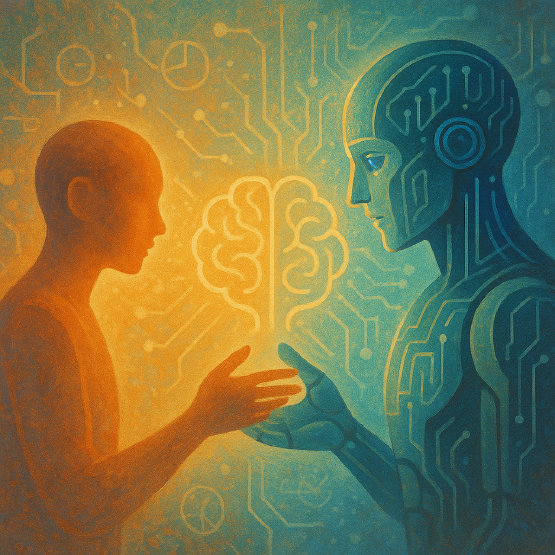The Intersection of Humanity and Technology in Future Society: The Importance of Creativity and Critical Thinking
Relationship between Artificial Intelligence and Human Existence
The advancements in artificial intelligence and automation technologies that we face today go beyond mere industrial innovations or technological leaps. It represents a civilizational shift that questions the essence of human existence and the foundations of society, a massive movement that shakes the very paradigm of an era. This wave of technology invokes memories of the past, reconfigures the current order, and simultaneously encourages us to imagine future possibilities. Technology is no longer just a tool. It has become a cultural event that transforms frameworks of thought, redraws the map of sensory experiences, and redefines the status of human existence.
Redefining Humanity
Artificial intelligence challenges human-centered value systems while prompting a reconsideration of the unique possibilities and limitations of humanity. As machines move beyond being mere calculators or automation devices, imitating patterns of emotion and even attempting artistic creation, we naturally confront fundamental questions. Before asking what we can do, we cannot help but ask what we should be. These questions signal a crisis brought about by technology and present an opportunity for a creative transformation to rediscover our humanity.
Change in the Concept of Labor
The concept of labor is also passing through a significant turning point. Automation and algorithms are dismantling existing labor structures, readjusting the role of humans in the name of efficiency and productivity. However, this change does not render humans unnecessary. Rather, the abilities of creative thinking, emotional empathy, and ethical judgment, which machines cannot dare to replicate, shine even brighter. The moment we try to compete with technology, we become subservient to its logic. Yet, if we use technology as a mirror for reflection, the unique capabilities of humanity are highlighted even more intricately within it.
The relationship between film and philosophy
Movies are an irreplaceable medium for intuitively understanding these changes and revealing the essential questions within them. Ridley Scott's Blade Runner (1982) explores the meaning of humanity, memory, and death through artificial beings that are nearly indistinguishable from humans. The Matrix (1999) breaks down the boundaries between digital and physical reality, sharply capturing how technology reconstructs human perception and identity. These works are not mere predictions of the future, but deep philosophical inquiries that question the ethics and ontology of humans living in the age of technology, serving as a framework for thought.
Reconstruction of Human Existence
Furthermore, the cyberpunk and posthuman discourses that emerge in literature, philosophy, and film theory aim to dismantle the boundaries between machines and humans, redefining the essence of what it means to be human. In that world, humans are no longer complete beings. They manifest as fluid entities that interact with technology, merging and transforming with new codes such as genes, information, and artificial intelligence. The fixed essence of humanity is deconstructed, and instead, humans are reconfigured as 'becoming humans' and 'entities that live while becoming.' This movement ultimately brings the age-old question of 'What is a human?' back into the most contemporary discourse.
Critical Reflection in the Age of Technology
At the center of this civilizational transition, the competencies we must possess are systemic thinking and critical reflection. Smart cities, algorithmic finance, and digital healthcare enhance our lives, making them more convenient and precise, but they also come with complex ethical issues such as privacy infringement, technological monopolies, and data bias. We must evolve from being mere consumers of technology to reflective beings who understand its operational logic, analyze social implications, and consider the potential consequences it may bring. This is the practical foundation of 21st-century democracy and the essence of technology ethics.
Direction and Future of Education
Therefore, education should not merely be a process of 'acquiring' skills, but should shift towards 'reflecting' on human existence through those skills. The next generation, who will live in the future, needs to have not only problem-solving abilities but also the imagination to consider what problems to raise. Machines are skilled at finding answers, but they cannot tell us what questions to ask. Those questions can only be posed by humans, and that is the very beginning of what it means to be human.
Relationship between Technology and Humanity
Technology has infiltrated our lives to an irreversible extent, and its evolution will never cease. In the face of this vast current, the most important question we must pose is clear. Will technology replace humans, or will it expand humanity? Will we become beings defined by technology, or will we reconstruct ourselves through it? The answer can only be found within creativity, critical thinking, and a sense of communal responsibility.
Vision for a Sustainable Future
A sustainable future is a world where humans and machines coexist not as competitors but as partners, collaborating to expand each other's possibilities. To achieve this, there must be a cultural foundation that continuously reflects on not only the scientific exploration surrounding technology but also its impact on human society and its ethical implications. Film, literature, philosophy, and systems analysis serve as windows that enable such long-term contemplation and are mirrors we should look into.
Human-centered technological civilization
Technology is a powerful force that can change the human condition. However, it is not the technology itself that determines the direction. It depends on what kind of world we dream of and how we think, feel, and act. To move towards a human-centered technological civilization, we must live as questioning beings. And at the center of those questions, there should always be the value of 'better humanity.'

Post a Comment